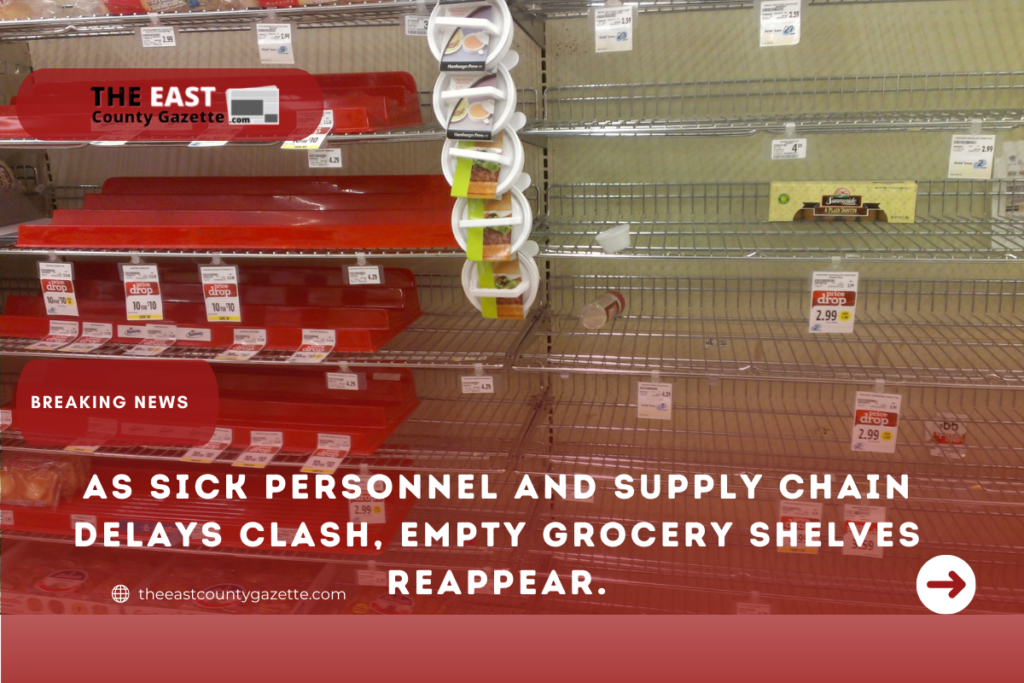Store shelves are once again bare as grocery employees call in sick and truckloads of food arrive late to the store.
That is just one of the most recent consequences of the omicron variety, which is putting pressure on the workforce. Investors are feeling the pressure and preparing themselves for a lengthier time of high labor, transportation, and food prices in the future.
Large grocery retailers such as Albertsons, Kroger, and Walmart saw their stock prices fall on Tuesday.
Albertsons’ stock plunged 9.75 percent to $28.79 after the close of the market after the firm disclosed supply chain issues and inflated expenses it is experiencing on its results call, according to the company.
Despite the fact that the supermarket boosted its fiscal 2021 outlook, the stock price of the company plummeted. During the same period, Kroger’s stock decreased about 3 percent, while Walmart’s stock fell less than 1 percent.
As the extremely contagious strain of covid spreads, the number of cases and hospitalizations in the United States has reached record levels. According to data provided by Johns Hopkins University, approximately 1.5 million new cases were recorded in the country on Monday alone.
According to data maintained by the Department of Health and Human Services, the number of Americans hospitalized with the virus has topped the previous winter’s peak, with 144,441 Americans admitted to hospitals with the virus as of Sunday.
Employees are feeling the pressure.
Those who work in grocery stores are also suffering from the impacts of the omicron. Samantha Webster works as a dairy manager at a Safeway supermarket in the San Francisco Bay Area, where she helps replenish coolers with butter, gallons of milk, and other dairy products. Albertsons is the company that owns Safeway.
She claims that since the beginning of December, an increasing number of employees have had to take time off work either to have contracted Covid or be in close contact with someone who is unwell. She stated that 15 employees are currently absent from the store’s almost 60-member workforce.
She claims that fewer pallets are arriving from Safeway’s warehouses and that there aren’t enough grocery personnel to assist in unloading them.
Cream cheese and yogurts are no longer available in the dairy section, leaving a gaping void where they used to be. There are no fresh bagels or loaves of bread in the bakery section of the store. Additionally, potatoes are running low in the produce department.
There are evidence of pressure in other aisles, as well, according to her, such as a shelf piled high with cans of clam chowder soup since other types, such as minestrone and pea soup, had not yet been delivered.
According to her, “the shelves are growing more and more empty.” “It’s impossible for one person to keep an entire department running.”
Read More: Before Filing Taxes, You Should Read IRS Letter 6419 – What Is It and Why Should You Read It?
CEO claims that Covid is intentionally prolonging out-of-stocks.
Vivek Sankaran, the CEO of Albertsons, stated on the conference call that the supermarket has been experiencing low inventory or missing items in various categories for several months. He claims that the recent surge in Covid cases is causing some of the out-of-stocks to be extended.
“We were anticipating that supply difficulties would get more resolved as we moved forward into this period,” he said on the conference call.
“Omicron has made a slight dent in that. ” As a result, there are greater supply issues, and we anticipate that there will be additional supply challenges over the next four to six weeks.”
Because of the new coronavirus strain, there is an increase in worker shortages across all industries, from restaurants and retailers to airlines and transportation companies. Company executives are being forced to make difficult decisions, such as reducing service hours, canceling flights, and closing storefronts, among other things.
This has also begun to be reflected in the sales figures as well. Among the businesses that have warned that fourth-quarter profitability and revenue will be on the low end of expectations is Lululemon, which is suffering from the effects of decreased hours and a smaller workforce than anticipated.
Grocers, on the other hand, may find the obstacle more difficult to overcome because they operate in a low-margin industry in which they have less room to boost staff wages, pay for overtime, or pass on greater expenses to customers.
Some shoppers are also unable to spend because of financial constraints. The child tax credit, which provided monthly payments to families, expired at the end of December.
Albertsons executives announced on Tuesday that expenses for ingredients, packaging, transportation, and labor have increased. They claimed that while the supermarket has passed over part of the inflation, it has attempted to keep prices of important items that customers purchase on a regular basis stable.

